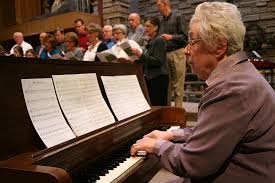Lately I’ve been dealing with some odd neurological issues. I’ve been experiencing strong enhancements of three of my senses, the first of which was my olfactory system, my sense of smell. I still can’t tell if what I perceive is a highly amplified sense, or an illusion. Then came my auditory sense: it seems my hearing capacity has multiplied by fifty percent. This is interesting as the schola now sounds like the Morman Tabernacle Choir, I can hear the homilies at volume 11, and confounding because the slightest imperfection in pitch accuracy annoyingly distracts me. (The third sense is taste, Cabernet Sauvignon of any quality ain’t workin’ no mo’. Loss of red hasn’t mitigated the other two sensory overloads!)
The intensity of my hearing caused me to change a rehearsal strategy last week. As a director, the last prior rehearsals were frustrating because I couldn’t have the usual holistic approach towards rehearsal goals while distracted with such vagaries as pitch and diction problems. So I tried a new strategy- I asked my organist/accompanist to run last week’s rehearsal. I was thus enabled the relief of just being a tenor, though I did help manage a few concerns as we went along. As we trekked through an hour and a half’s rehearsal it dawned on me for the thousandth time how important accompanists are to our success. If you’re an organist-cum-director, just imagine yourself as Jekyll and Hyde.
As a veteran of both church and school (elementary through collegiate) choral education, utilizing an accompanist as a rehearsal tool was a regular and di rigeur/SOP strategy, ala “You take the women while I’ll work the men.” When needing a sick day, if your accompanist was strong, you had no worries. If not, you worried a lot. But I’m sure we who are not gifted with accompaniment skills fully realize how much of our successful endeavors rely upon the charisms and talents of “the pianist.”
I won’t belabor this obvious reality in this short piece. But I strongly offer that a choirmaster (who’s not the organist) consider the schema of letting the other professional in the room regularly lead rehearsals. There are so many benefits to consider- being able to audit the various sections independent of having to martial the whole choir, the possibility that the accompanist will uncover weaknesses in the choir that weren’t evident to the director, the immediate modeling you can provide to sections that you sit and sing in during rehearsal, the relief from whatever your Modus Operandi routines have numbingly become habitual, and likely a hundred other plus factors each of us could cite.
I’ve been blessed in my career as a choral director. In over forty years I’ve only had one “less than” greatly talented accompanist, and at least that burden was relieved by the pianist’s unique personality. And currently I have an organist (with me 24 years) and two pianists, one with me for 43 years, ha ha! ,who are exemplary talents. So I’d be more of a fool if I didn’t take advantage of their vast treasuries of experience and artistic accomplishments. Here’s a great shout to our “piano players.”

